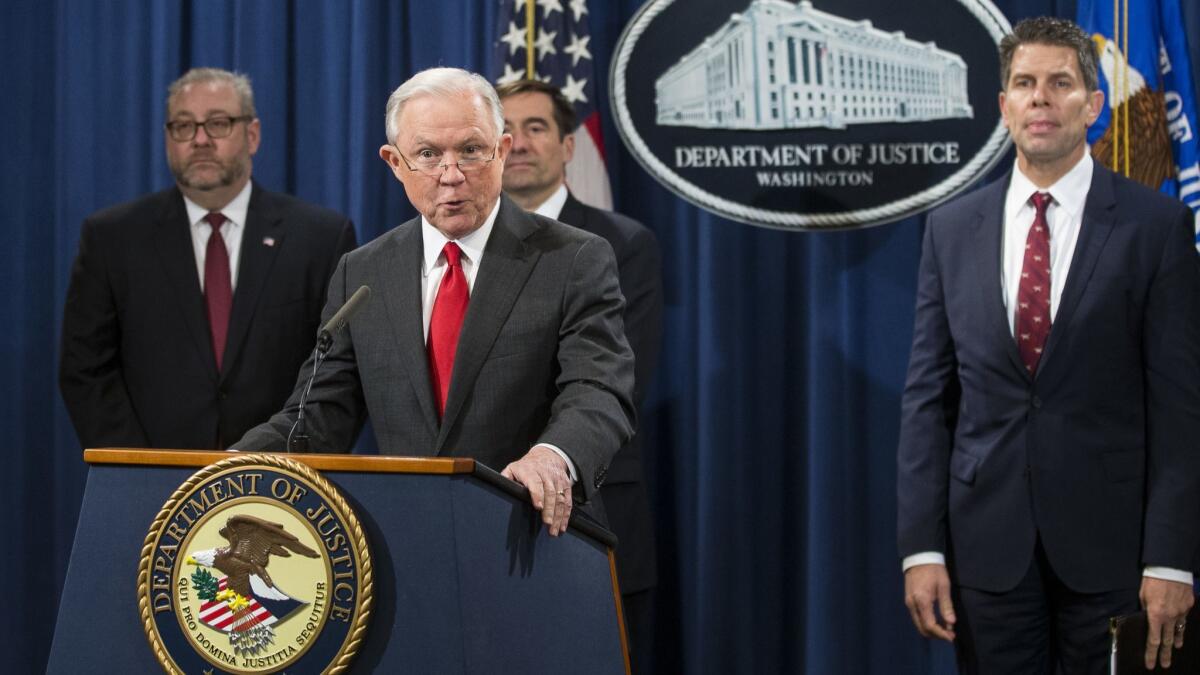With new indictment, U.S. launches aggressive campaign to thwart China’s economic attacks

The Justice Department on Thursday unveiled a broad new initiative to combat China’s mounting criminal economic activity as authorities charged three Chinese individuals and a Chinese company with trade-secret theft.
Thursday’s actions follow a series of moves meant to put Beijing on notice. The Trump administration has prioritized countering threats to U.S. national and economic security as China seeks to supplant the United States as the world’s dominant economic power. The administration already has imposed tariffs on $250 billion worth of Chinese goods, and since September federal prosecutors have brought charges in three intellectual- property-theft cases allegedly involving Chinese spies and hackers.
“Chinese economic espionage against the United States has been increasing — and it has been increasing rapidly,” said Atty. Gen. Jeff Sessions. “Enough is enough. We’re not going to take it anymore.”
Under the initiative, Sessions said, the department will pursue trade-secret-theft cases, and develop a strategy to identify researchers and defense industry employees who’ve been “co-opted” by Chinese agents to transfer technology to China, Sessions said.
“China wants the fruits of America’s brainpower to harvest the seeds of its planned economic dominance,” Assistant Atty. Gen. John Demers said. With the new initiative, he said, “we will confront China’s malign behaviors and encourage them to conduct themselves as they aspire to be: one of the world’s leading nations.”
The indictment alleges that the defendants conspired to steal trade secrets from Micron, an Idaho-based semiconductor company. Micron is worth an estimated $100 billion and has a 20% to 25% share of the dynamic random access memory industry — a technology not possessed by the Chinese until very recently, Sessions said.
He outlined a number of laws that prosecutors would use, including the Foreign Agents Registration Act to identify unregistered agents seeking to advance China’s political agenda.
Congress in August passed the Foreign Investment Risk Review Modernization Act to expand the government’s power to review investments from foreign countries — a response in large part to China’s increasingly aggressive efforts to obtain U.S. technology through mergers, acquisitions and takeovers.
And last month, the Treasury Department released interim rules to implement the new law. Sessions said the Justice Department will work with the Treasury Department on developing those regulations.
The Justice Department will also identify opportunities to tackle Chinese threats to the U.S. “supply chain” of companies that provide components for sensitive technologies, especially those in the telecommunications sector as it readies for the transition to 5G networks.
“This is consistent with the state of confrontational actions over the last couple of weeks taken by the administration to tackle everything China’s trying to do,” said Samm Sacks, a senior fellow at the Center for Strategic and International Studies. “It’s bigger than intellectual-property theft. It’s supply-chain risk. It’s China’s efforts to be global leaders in 5G. It’s traditional espionage. It’s influence operations. This is part of a much broader whole-of-government approach to countering China’s efforts to gain strategic advantage, particularly in emerging technology.”
For months, the Trump administration has been considering ways to decouple the U.S. and Chinese tech sectors: restricting visas for Chinese students in the scientific, engineering and math fields, banning Chinese telecommunications equipment companies from U.S. 5G networks, expanding export controls on U.S. tech firms, and increasing official scrutiny of Chinese investments and joint U.S.-Chinese research, Sacks said.
More to Read
Start your day right
Sign up for Essential California for news, features and recommendations from the L.A. Times and beyond in your inbox six days a week.
You may occasionally receive promotional content from the Los Angeles Times.





